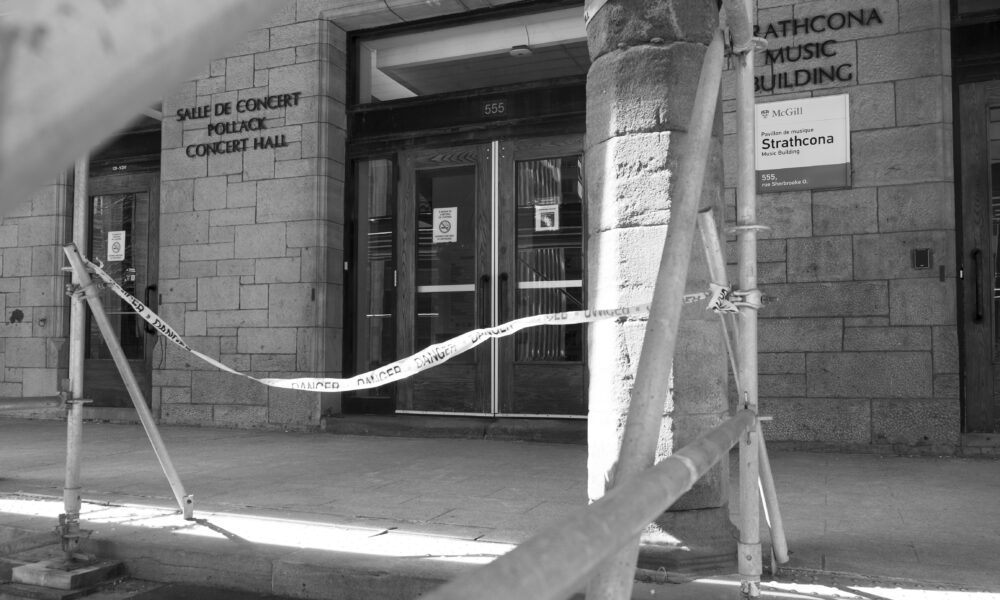My first semester at McGill marked my 12th year playing the violin, and I auditioned for the Classical Music Club as soon as I knew whom to email. I was placed in a trio with a flutist and a pianist and we were told to rehearse in a room on the fourth floor of the University Centre on Monday nights. As the music school practice rooms are open only to those with a Schulich School of Music student ID, practice rooms for any non-music students are nestled far and wide in the far and high-up corners of campus. Without the all-consuming commitment required to get a music degree at McGill, a musician is exiled to the periphery of McGill’s facilities.
On the night of our first rehearsal, my flutist, pianist, and I met outside our allotted room in which another pianist and violinist were rehearsing an impressive duet. We waited for ten minutes, then sent our own pianist unwillingly to claim our rehearsal space. We felt awful, and the talented duet apologetically shuffled out.
The next week the room was locked, as it was the week after. By the fourth week, our trio deserted the likely locked rehearsal space and opted instead to break into one of the Schulich School of Music practice rooms. This was both stressful and time-consuming, as it meant we had to trudge up and down the staircases until we caught a music student leaving the other way. Then we would slip into the hallway on the other side, and test our luck at an open room. As both the practice rooms and the music lockers open only to music-student ID cards, us recreational musicians found ourselves barred from a practice space, and without a place to keep a violin or a flute except for our bedrooms at home. I cannot imagine my predicament had I chosen twelve years ago to play the tuba.
McGill’s Schulich School of Music is a prestigious school that attracts musicians from across the world. As grateful as I am to be at an institution where musical talent is given so much attention, I resent the way in which this attention has shut out what I consider a middle-class of musicians, like myself.
All three of us were good musicians. Our pianist had been playing longer than I had, and knew all of J.S Bach’s twenty children; our flutist was shy and nimble and could play arpeggios of high sixteenth-notes like the songbird on imagines a flute should emulate. I, for my own part, could play the entire Bach Double by heart and could sight-read most moderately challenging pieces of music on the first try. But finding space to practice as a group––an official music group, part of an official McGill music club––was more difficult for us than learning the musical repertoire we had to play. Finding a space at all was lucky, and twice when we succeeded we were shortly asked to leave––first by an opera singer and then by a cellist. We evacuated, peeved. However, our frustration was not at the musicians who kicked us out but at the fact that we––though not rehearsing for the Philharmonic––could not have a space to at least try.
Playing recreational music is made difficult at McGill. It is limiting enough that McGill does not have an arts centre for fine and performing arts, but to then render the few available spaces as unavailable and exclusive prevents a dimension of well-roundedness that ties an aloof academic institution like McGill to other important corners of the world—like pulling out a guitar at a dinner party instead of opening a discussion of Weber’s concept of the state.
There is nothing commendable in evicting those of us who––regardless of skill level––have brought our instruments to university with us and want to play, whether we can play Paganini or not. A recognized school club such as the Classical Music Club, or those rehearsing for the novice Beethoven Orchestra, should not face relegation to the fourth floor of the University Centre for an unreliable practice space, the same way an individual involved in nothing except their own love of music should have just the same opportunity.
As McGill already chooses not to invest in a fine arts program—or in an arts centre for fine and performing arts at all––the least it could do is open its music facilities to anyone who wants to play music.








